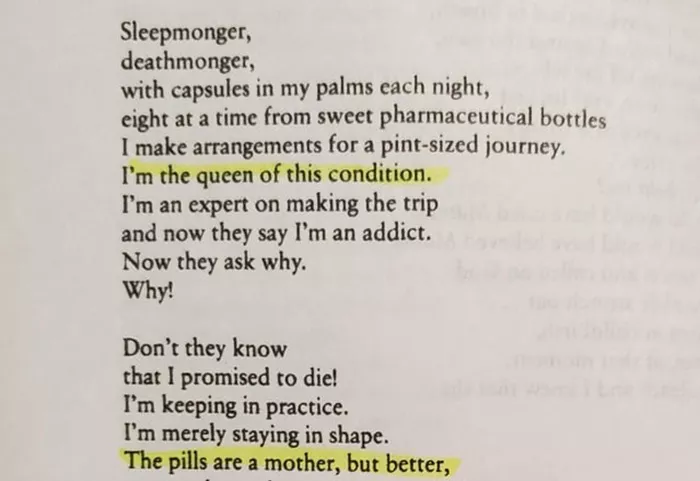Welcome to Poem of the Day –The Addict by Anne Sexton
Anne Sexton is one of the most powerful voices in 20th-century American poetry. Her work often explores dark and personal themes, including mental illness, addiction, and the struggles of womanhood. The Addict is one such poem. It offers a raw and emotional view of her experience with drug dependency. In this article, we will break down the poem in a simple, clear, and logical way. We will look at its meaning, tone, and poetic devices.
The Addict Explanation
Overview of The Addict
The Addict is a poem about dependency—on pills, and more deeply, on the escape they offer. Sexton writes from the perspective of someone who struggles with drug use. The speaker reflects on how the pills take control. They are not just medicine—they are a force, an obsession, and even a companion.
Structure and Form
The poem is written in free verse. There is no regular rhyme or meter. This style fits the subject matter. Addiction is chaotic and unpredictable. The form mirrors that experience.
The poem is broken into stanzas of varying length. This helps guide the reader through different stages of the speaker’s thoughts and feelings. There is no strict pattern, which reflects the unstable state of the addict’s mind.
Line-by-Line Explanation
Let’s look at key lines and their meaning.
“Sleepmonger, deathmonger, / with capsules in my palms each night…”
These lines start with powerful images. “Sleepmonger” and “deathmonger” are invented words. A monger is someone who deals or trades in something. The speaker is calling the pills both sleep-givers and death-dealers. This shows how the drugs are both comforting and dangerous.
The capsules in her palms suggest a ritual. She takes them each night, like a prayer. But instead of salvation, they bring sleep or possibly death.
“to whom do I owe the / leper in my head?”
Here, Sexton compares her mental illness to a “leper.” Leprosy is a disease that causes isolation and decay. She feels mentally diseased, alone, and beyond help. She wonders who caused this—who is to blame for her broken state.
“What is your name? / Are you the nameless woman I ran from…?”
This part becomes more abstract. The speaker is talking to the addiction, or maybe to herself. She gives the addiction a face, a name, even though it remains vague. It’s like running from a part of herself she cannot escape.
“Not that I mind the horror / that keeps me awake…”
These lines show the split within the speaker. She admits that the pills help her deal with the “horror.” But she also hints that the horror is part of her. It has become normal. She doesn’t mind it anymore. That’s a chilling sign of how deeply the addiction has taken hold.
“I am queen of this summer hotel / or the laughing bee on a stalk / of death.”
This is one of the most striking images. A “summer hotel” could be a reference to a psychiatric hospital or a place of retreat. She calls herself the “queen,” suggesting control. But it’s ironic. She is not truly in charge. The drugs rule her.
The second line adds another image: a “laughing bee on a stalk of death.” It shows contrast. The bee is happy, but the stalk it sits on brings death. The speaker finds strange joy in something that is killing her.
“I say I’m asleep. / It is the bed I confess to.”
At the end, Sexton presents the bed as a confessional. It’s a place where she lies down not just to sleep, but to face her own truth. She “confesses” not to a priest, but to the quiet of the night. Sleep becomes a form of surrender, and perhaps guilt.
Themes in the Poem
Here are the main themes in The Addict:
-
Addiction: The central theme. The poem shows the pain, need, and confusion that come with drug dependency.
-
Mental Illness: Sexton writes honestly about her troubled mind. The pills are both a cure and a curse.
-
Control vs. Powerlessness: The speaker wants control but feels powerless. She calls herself “queen” but is ruled by the pills.
-
Life and Death: The poem moves between moments of life (bees, summer) and death (leper, horror, stalk of death). Addiction blurs that line.
-
Isolation: The speaker is alone in her struggle. Even the bed becomes her only place of confession.
Tone and Mood
The tone of The Addict is confessional, haunting, and honest. Sexton doesn’t hide her pain. She exposes it. The mood is heavy and unsettling. Yet there is a strange beauty in the way she writes. Even in despair, she finds words that move the reader.
Poetic Devices
Sexton uses many literary tools:
Metaphor: Pills become friends, enemies, and gods. Mental illness becomes a “leper.”
Imagery: Vivid pictures fill the poem—capsules in hands, bees, death-stalks.
Personification: Addiction is given a face and voice.
Repetition: Some images echo through the poem, like sleep and death.
Irony: The speaker says she is in control, but we know she isn’t.
Conclusion
The Addict is more than just a poem. It is a cry for help, a mirror of inner turmoil, and a warning. Sexton shows what it feels like to lose control. Her honesty is brave. Through her words, readers can better understand the deep pain behind addiction. This poem does not offer hope, but it does offer truth—and sometimes, that is even more powerful.

